Top 15 SEO Competitor Tools to Boost Your SERP rankings
When you try to rank on Google, you're not competing alone. Other sites are fighting for the same keywords, featured snippets, and organic search traffic. If you don't monitor SERP competitors, you end up guessing why their pages move up while yours stay behind.
This is why competitor analysis matters. You need to see the keywords they target, the backlinks they get, the ranking positions they gain or lose, and even the minor content updates they make. These signals help you shape a better SEO strategy and react before rankings drop.
Most SEO tools focus on keyword rankings, backlink data, rank tracking tools, and content gaps. But one area that gets ignored is website change monitoring. ScrapX covers this gap by tracking text updates, visual changes, and public-page movements in a safe and compliant way. It helps you understand when a competitor refreshes content, changes pricing, tweaks a heading, or adjusts a page layout, all the tiny shifts that affect organic search performance.
This guide lists the top tools to help you track competitor keywords, compare ranking data, analyze content, and monitor SERP movements across search engines. We will also show how ScrapX fits into your SEO stack as the only tool built for ethical, automated page change tracking.
Top SEO Competitor Tools to Boost Your SERP Rankings
Now that we understand why tracking competitors matters, let's look at the tools that help you monitor SERP competitors, compare ranking data, and keep up with changes across search engines.
1. ScrapX — Best for Monitoring Competitor Website Changes
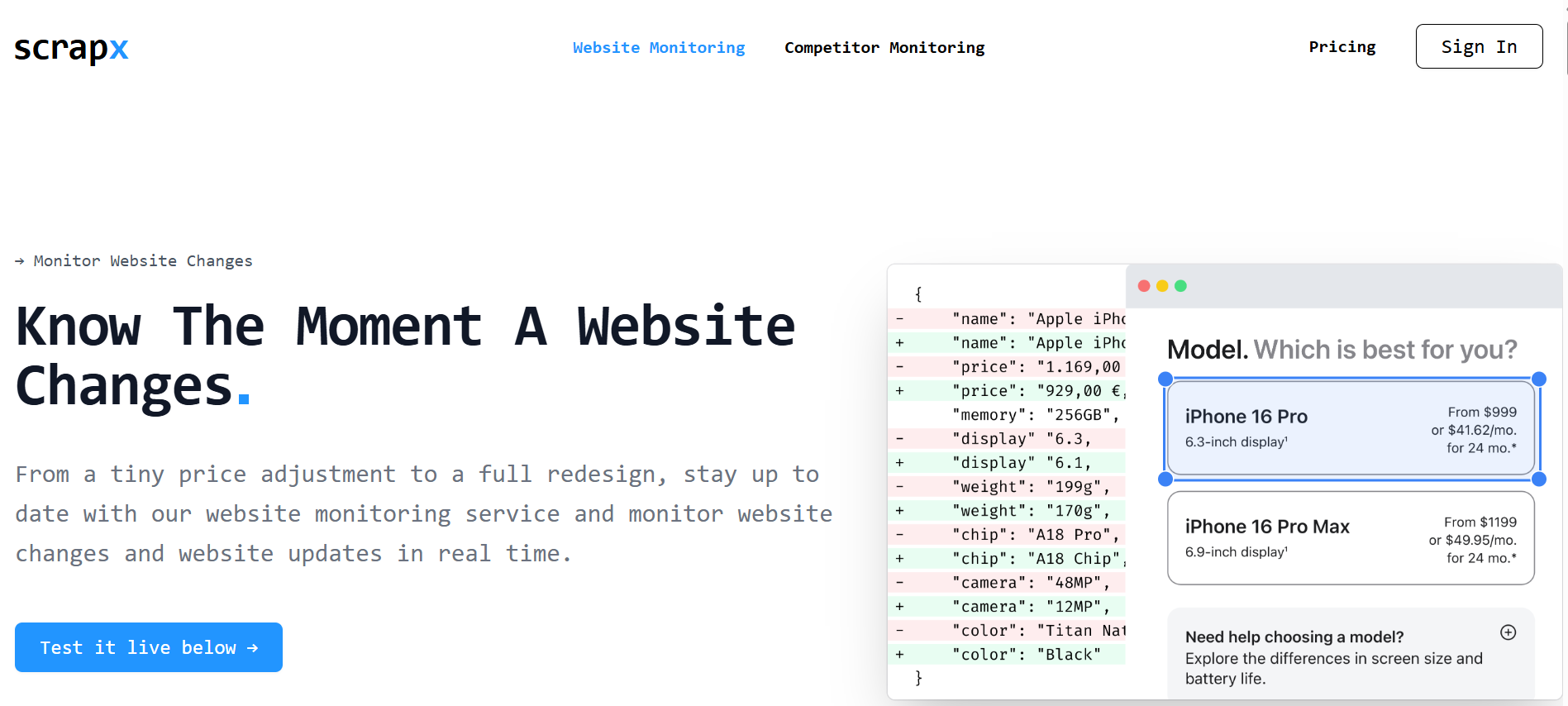
Best For: Ethical website change tracking (text, visual, SSL, and subdomain updates).
Key Features of ScrapX
Textual & visual change detection - ScrapX helps you track a page for any text edits or layout changes that may affect keyword rankings, SERP snippet improvements, or content freshness.
Data extraction for keyword or content tracking - You can extract specific blocks of text, tables, or sections to spot content gaps or shifts in long-tail keywords and ranking difficulty.
Notifications via email, Slack, or webhooks - This makes it easy for SEO teams, analysts, and developers to stay updated without checking pages manually.
Built-in compliance for ethical monitoring - ScrapX only tracks publicly available pages and avoids private or sensitive areas, making it safe for website monitoring SEO across your own domains or pages you have permission to follow.
Pros of ScrapX
- Real-time alerts that keep you aware of content changes, pricing updates, or new elements that may affect SERP competitors ranking.
- Unified dashboard for monitoring text, visuals, SSL expiry, and subdomain updates in one place.
- Easy setup with no coding needed, ideal for SMEs and marketing teams.
Cons of ScrapX
- Requires manual CSS selectors for very complex pages (learning curve for non-tech users).
Pricing of ScrapX
ScrapX has a straightforward pricing structure:
- Free: $0/month
- Basic: $11/month
- Pro: $29/month
- Mega: $89/month
This makes ScrapX one of the most affordable competitive intelligence tools, especially when you need to monitor SERP competitors while also watching changes on key competitor sites without scraping anything private.
2. Ahrefs — Best for Keyword and Backlink Analysis

Best For: Deep competitor backlink audits and keyword research.
Key Features of Ahrefs
Backlink Checker Tools - Shows where competitor sites get their backlinks, helping you spot link-building opportunities.
Site Explorer - Gives a full view of ranking positions, organic search traffic, keyword metrics, and content gaps.
Keyword Explorer - Helps you find long-tail keywords, ranking difficulty scores, and SERP features you can target.
Content Gap Tool - Identifies keywords your competitors rank for that you don't, useful for building a stronger SEO strategy.
Rank Tracking - Tracks competitor analysis data such as ranking fluctuations, SERP snippet visibility, and keyword rankings.
Pros of Ahrefs
- Accurate backlink checker tools for spotting link-building opportunities.
- Strong keywords and PPC keywords data for deep competitor analysis.
- SERP history view helps you follow long-term changes in search engine results pages.
Cons of Ahrefs
- Expensive for smaller teams.
- No subdomain monitoring or website monitoring SEO features like ScrapX.
Pricing of Ahrefs
Ahrefs' pricing plans are:
- Lite: $129/mo
- Standard: $249/mo
- Advanced: $449/mo
3. SEMrush — Best All-in-One SEO Suite
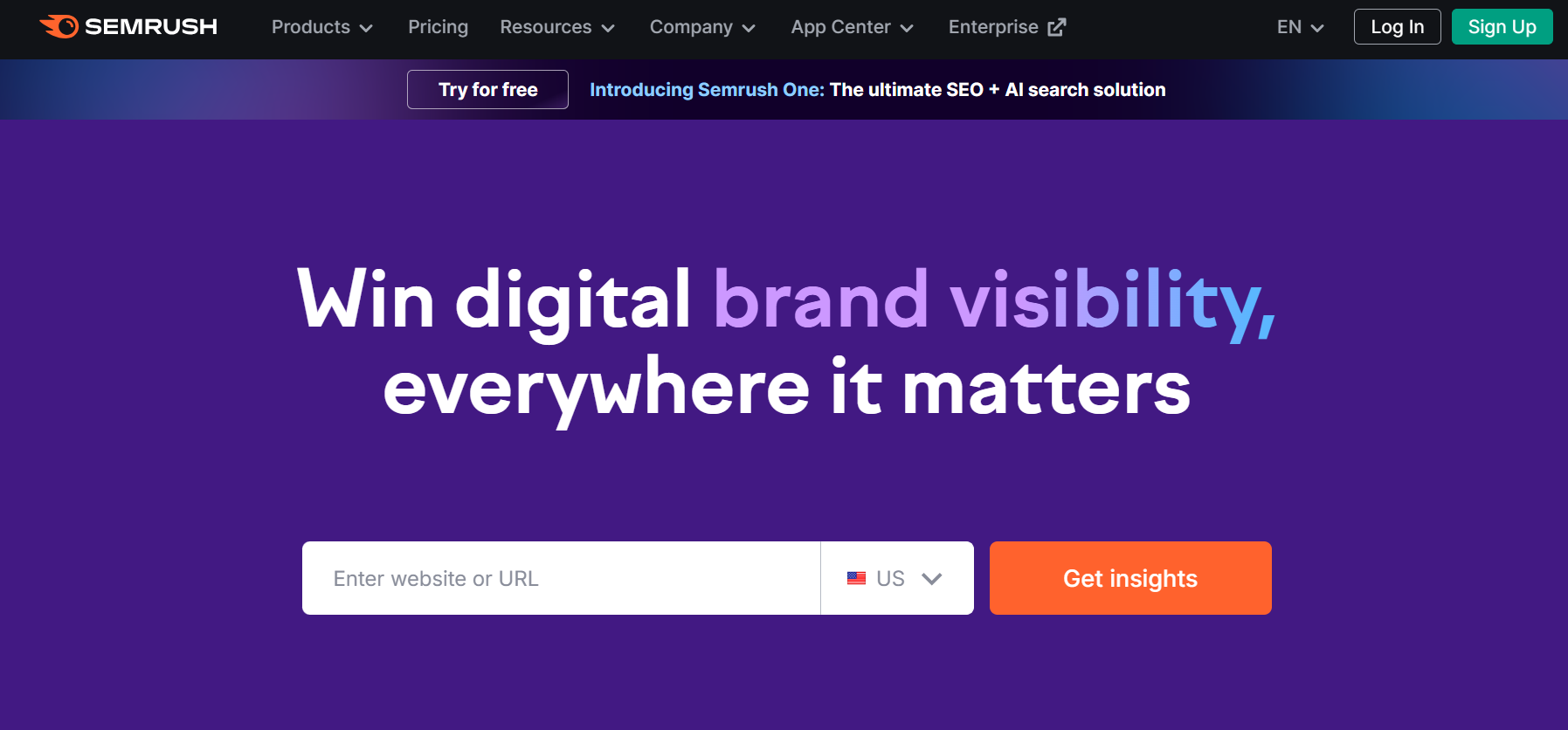
Best For: Full-scale competitor analysis across keywords, rankings, backlinks, and PPC keywords.
Key Features of SEMrush
Domain vs. Domain Comparison - Shows how your keyword rankings and organic traffic compare with competitor sites side by side.
Keyword Gap Tool - Reveals long-tail keywords and content gaps that your competitors rank for but you don't.
Traffic Analytics - Estimates organic search traffic, referral sources, and ranking positions for any domain.
SERP Checker & SERP Features Analysis - Identifies featured snippets, local map packs, and other SERP features your competitors appear in.
On-Page SEO & Site Audit - Finds technical SEO issues, slow pages, and site speed problems affecting ranking data.
Backlink Audit - Shows referring domains, toxic links, and domain authority signals.
Pros of SEMrush
- Covers keyword research, ranking tools, content analysis, PPC keywords, and backlink audits in one place.
- Helpful for agencies managing multiple local SEO strategy workflows.
Cons of SEMrush
- The interface can feel heavy for beginners.
- High pricing for advanced tracking and search limit expansion.
Pricing of SEMrush
Semrush has the following pricing plans:
- Starter: $199/mo
- Pro+: $299/mo
- Advanced: $549/mo
4. SpyFu — Best for Paid and Organic Keyword Tracking
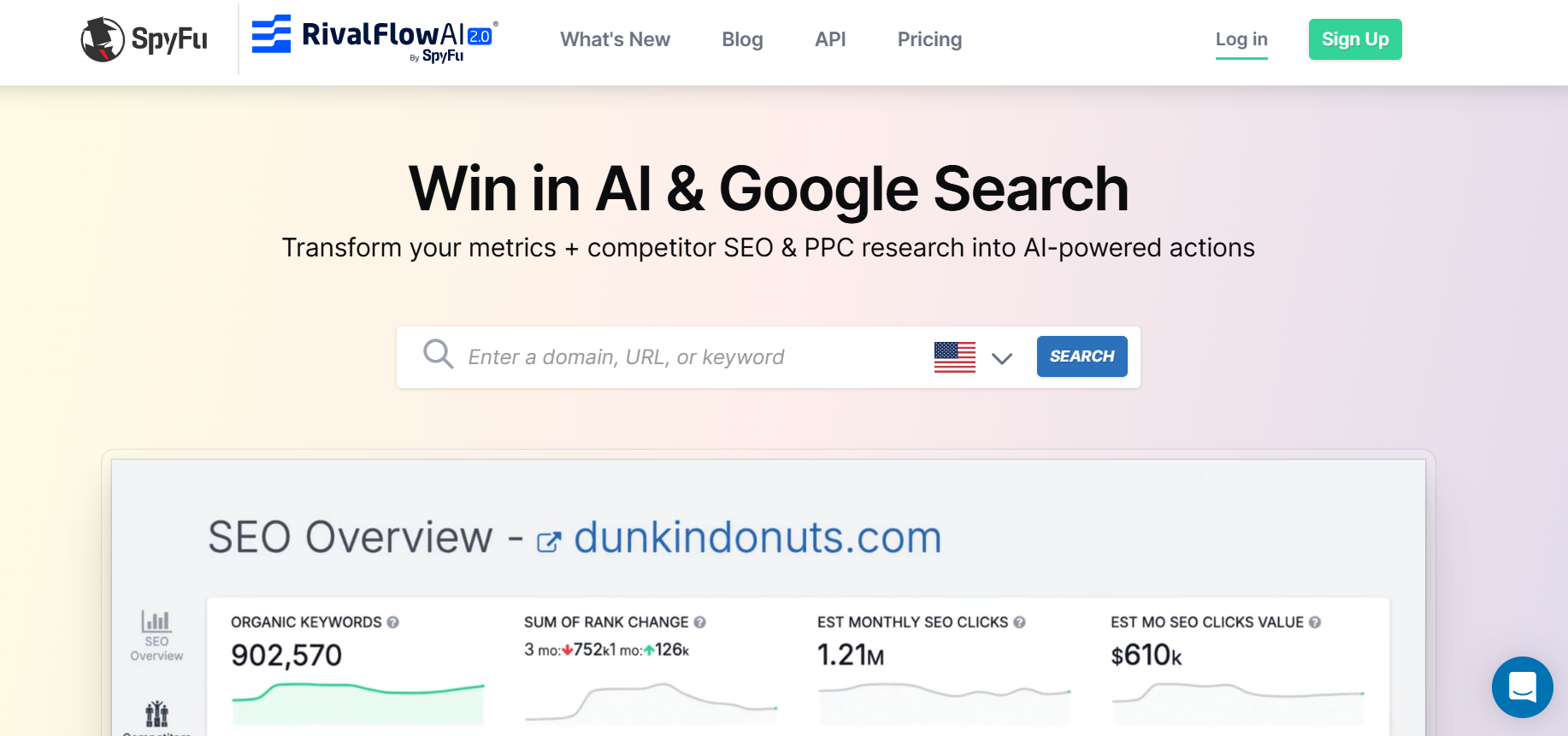
Best For: Tracking competitor paid keywords, SEO history, and long-term ranking positions.
Key Features of SpyFu
PPC Keyword Tracking - Shows the PPC keywords your competitors bid on so you can understand their ad strategy.
SEO Ranking History - Gives a clear timeline of ranking fluctuations for any keyword across search engines.
Competitor Keyword Research - Helps you track competitor keywords, see shared keywords, and find gaps in your own SEO strategy.
SERP Competitors Ranking - Displays how often a domain shows up on search engine results pages compared to yours.
Backlink Insights - Offers a simple view of backlink sources, anchor text, and link strength.
Pros of SpyFu
- Great for teams focused on PPC keywords and organic search tracking together.
- Simple interface makes keyword research easy.
Cons of SpyFu
- Backlink data lacks depth compared to Ahrefs.
- Limited technical SEO insights.
Pricing of SpyFu
SpyFu has the following plans:
- Basic: $39/mo
- Pro + AI: $59 for 1 month, $199/mo thereafter
- Team/Agency: $249/mo
5. SE Ranking — Best for Rank and Visibility Tracking
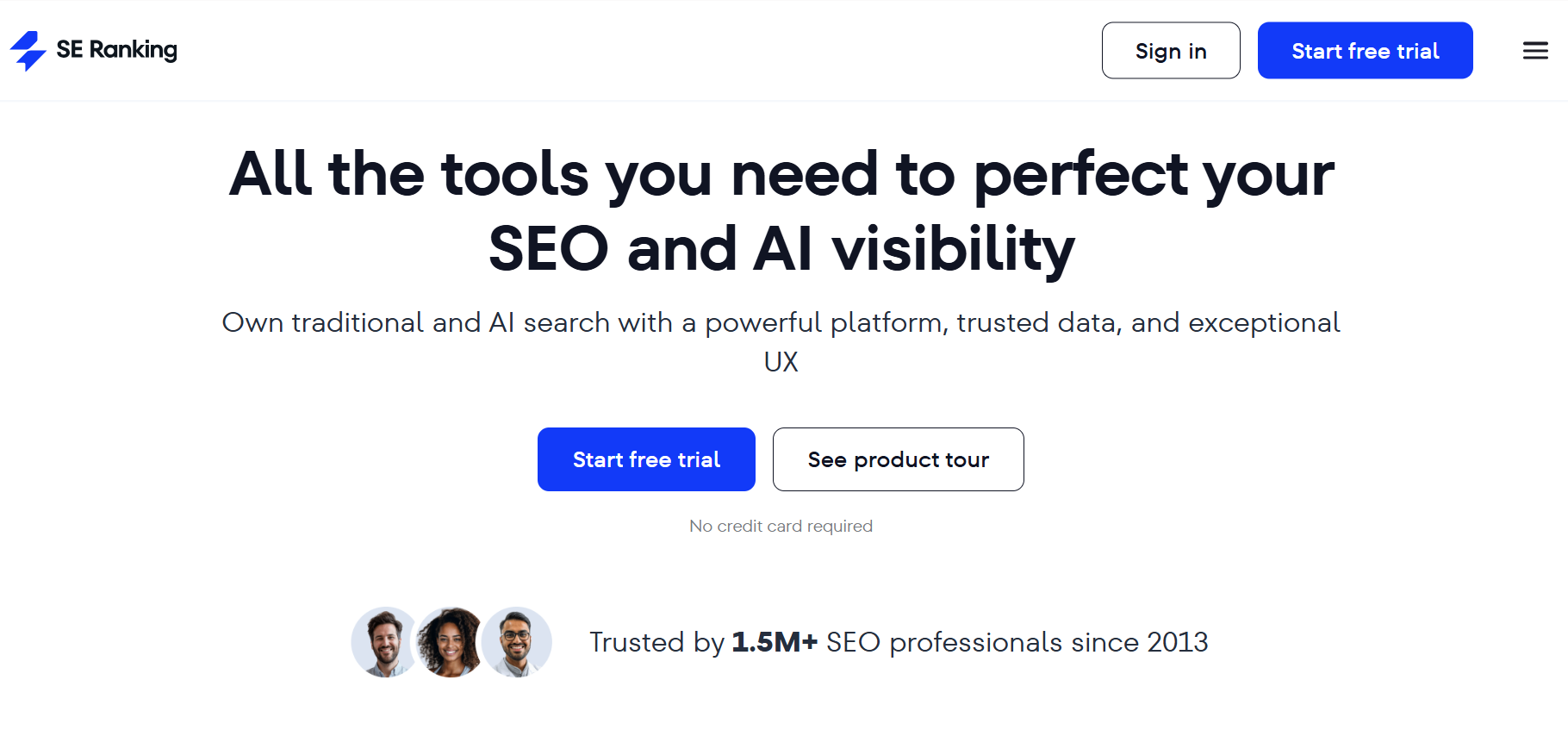
Best For: Agencies and teams that need daily rank tracking and simple competitor analysis.
Key Features of SE Ranking
Rank Tracking Tools - Tracks keyword rankings daily across search engines, locations, and devices.
Competitor Discovery - Finds competitor sites ranking for the same long-tail keywords and shows their ranking positions.
SERP Checker - Shows SERP features, featured snippets, and local search data for any keyword.
On-Page SEO Audit - Checks technical SEO issues, site speed problems, and missing tags.
Backlink Checker Tools - Shows backlink sources, link strength, and changes over time.
Keyword Research Tool - Provides keyword metrics such as ranking difficulty, search volume, and CPC trends.
Pros of SE Ranking
- Affordable for agencies managing many domains.
- Good keyword grouping and competitor comparison options.
Cons of SE Ranking
- Backlink database is smaller than Ahrefs.
- Limited advanced competitive intelligence tools.
Pricing of SE Ranking
SE Ranking offers the following pricing plans:
- Essential: $65/month
- Pro: $119/month
- Business: $259/month
6. Moz Pro — Best for Keyword Research and SERP Features
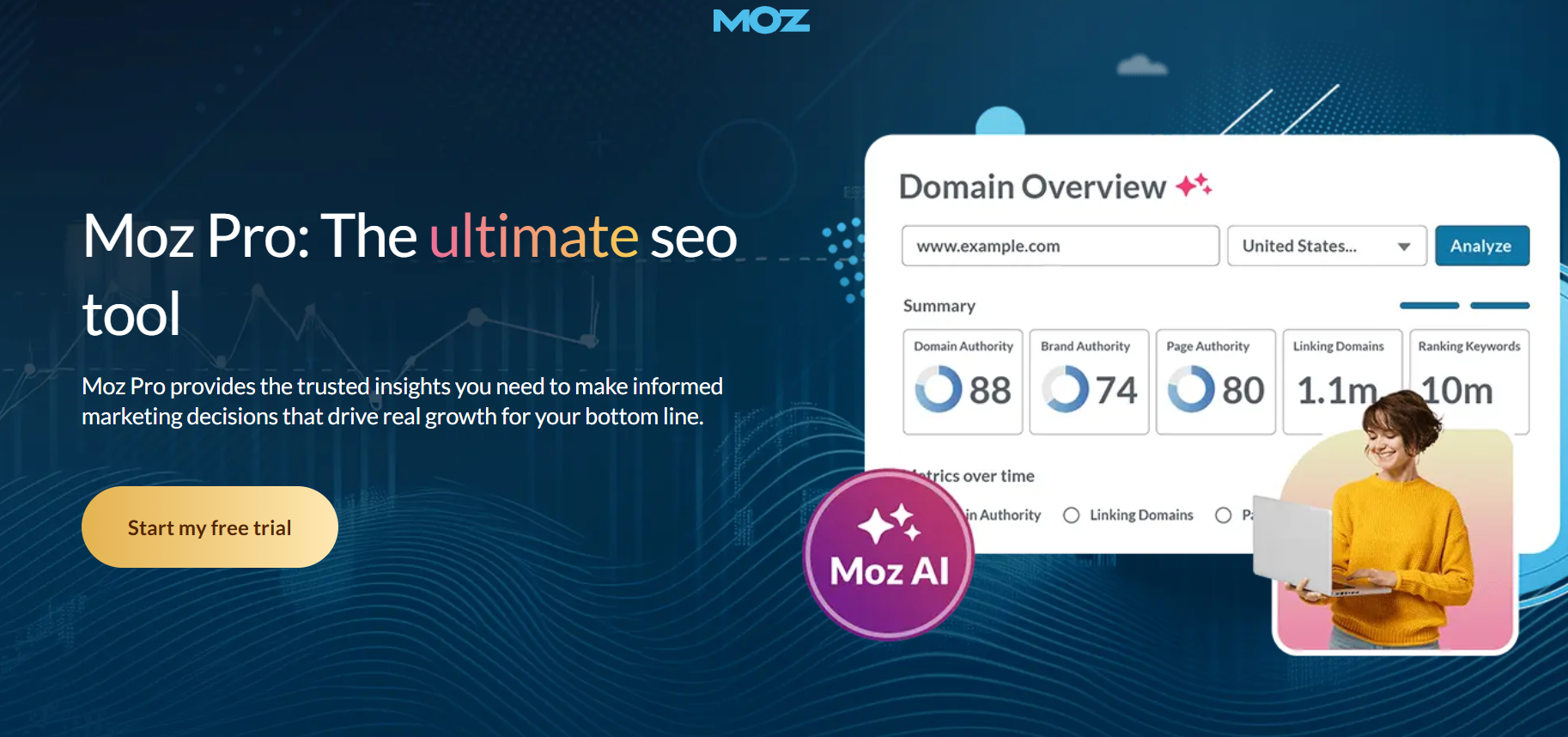
Best For: Tracking domain authority, keyword research, and SERP features across competitor sites.
Key Features of Moz Pro
Keyword Explorer - Gives keyword metrics such as ranking difficulty, search volume, long-tail keywords, and SERP feature visibility.
Link Explorer - Shows backlink profiles, domain authority, and linking domains for competitor analysis.
SERP Analysis Tool - Breaks down featured snippets, local map packs, and ranking positions across search engines.
On-Page SEO Tool - Checks title tags, meta descriptions, and technical SEO issues affecting organic search traffic.
Site Crawl Tool - Identifies errors, broken pages, and site speed issues that can hurt ranking data.
Rank Tracking - Tracks ranking fluctuations and keyword rankings for your main terms and competitor pages.
Pros of Moz Pro
- Helpful educational material and easy-to-understand keyword metrics.
- Good for tracking domain authority and SERP features at a glance.
Cons of Moz Pro
- Backlink index is slower to update.
- Fewer competitive intelligence tools than Ahrefs or SEMrush.
Pricing of Moz Pro
Moz Pro has the following pricing plans:
- Starter: $39/mo
- Standard: $79/mo
- Medium: $143/mo
- Large: $239/mo
7. Screaming Frog — Best for On-Page SEO and Technical Audits

Best For: Finding technical SEO issues, content gaps, and on-page problems across competitor sites.
Key Features of Screaming Frog
Full Site Audit - Crawls websites to find broken links, redirects, slow pages, and technical SEO issues affecting organic search.
Meta Data Extraction - Collects titles, headers, and descriptions so you can compare keyword usage and ranking positions with competitor sites.
Structured Data Review - Checks schema markup for FAQ, HowTo, and SERP snippet elements that help improve SERP features.
Content Analysis - Finds thin pages, duplicate content, and missing tags to improve ranking data and organic traffic.
Integration With Google Search Console and Google Analytics - Shows keyword rankings, search limit issues, and long-tail keywords directly inside the crawl.
Pros of Screaming Frog
- Free version crawls up to 500 URLs.
- Great for spotting site speed issues, page errors, and content gaps.
Cons of Screaming Frog
- Not cloud-based, so large crawls depend on your computer.
- No rank tracking or backlink checker tools.
Pricing of Screaming Frog
Free version available; paid version starts at $279 per year.
8. Visualping — Best for Visual Change Alerts
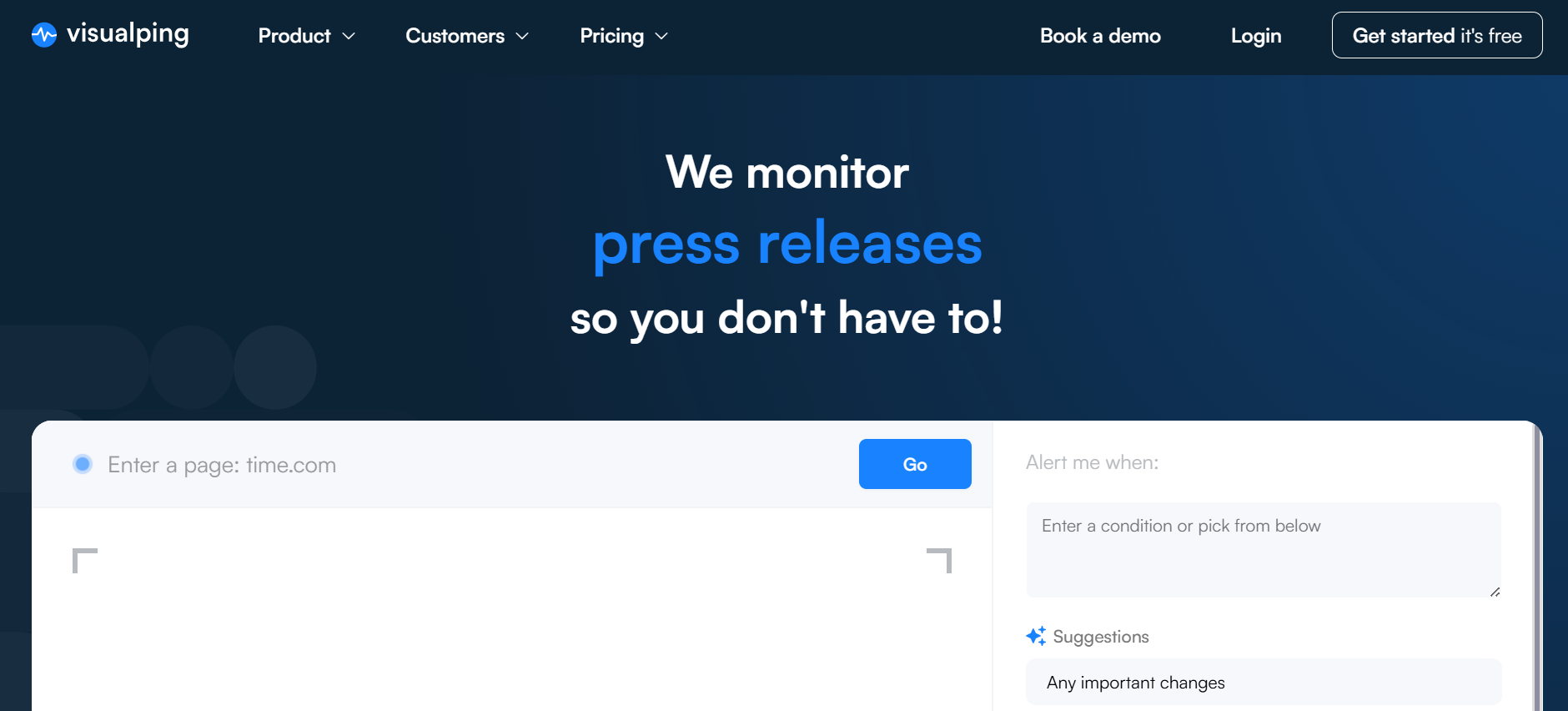
Best For: Tracking visual updates such as banners, CTAs, layout changes, and design shifts on competitor sites.
Key Features of Visualping
Visual Page Monitoring - Compares screenshots to show layout changes that may affect SERP snippet visibility or user signals.
Region-Based Tracking - Lets you track a page section, like pricing tables or CTAs, for quick competitor analysis.
Email and Slack Alerts - Send notifications when competitor sites update key sections that could influence keyword rankings or organic traffic.
Text Change Detection - Spots edits in titles, content blocks, or headings that may impact ranking positions.
Pros of Visualping
- Very easy to use for checking page changes manually.
- Helpful when you need visual monitoring alongside rank tracking tools.
Cons of Visualping
- Free tier offers limited monthly checks.
- No advanced SEO analytics tools or keyword data.
Pricing of Visualping
Visualping's pricing plans are:
- Personal: $70/month
- Business: $140/month
- Solutions: $3000/month
9. BuzzSumo — Best for Content Performance Tracking
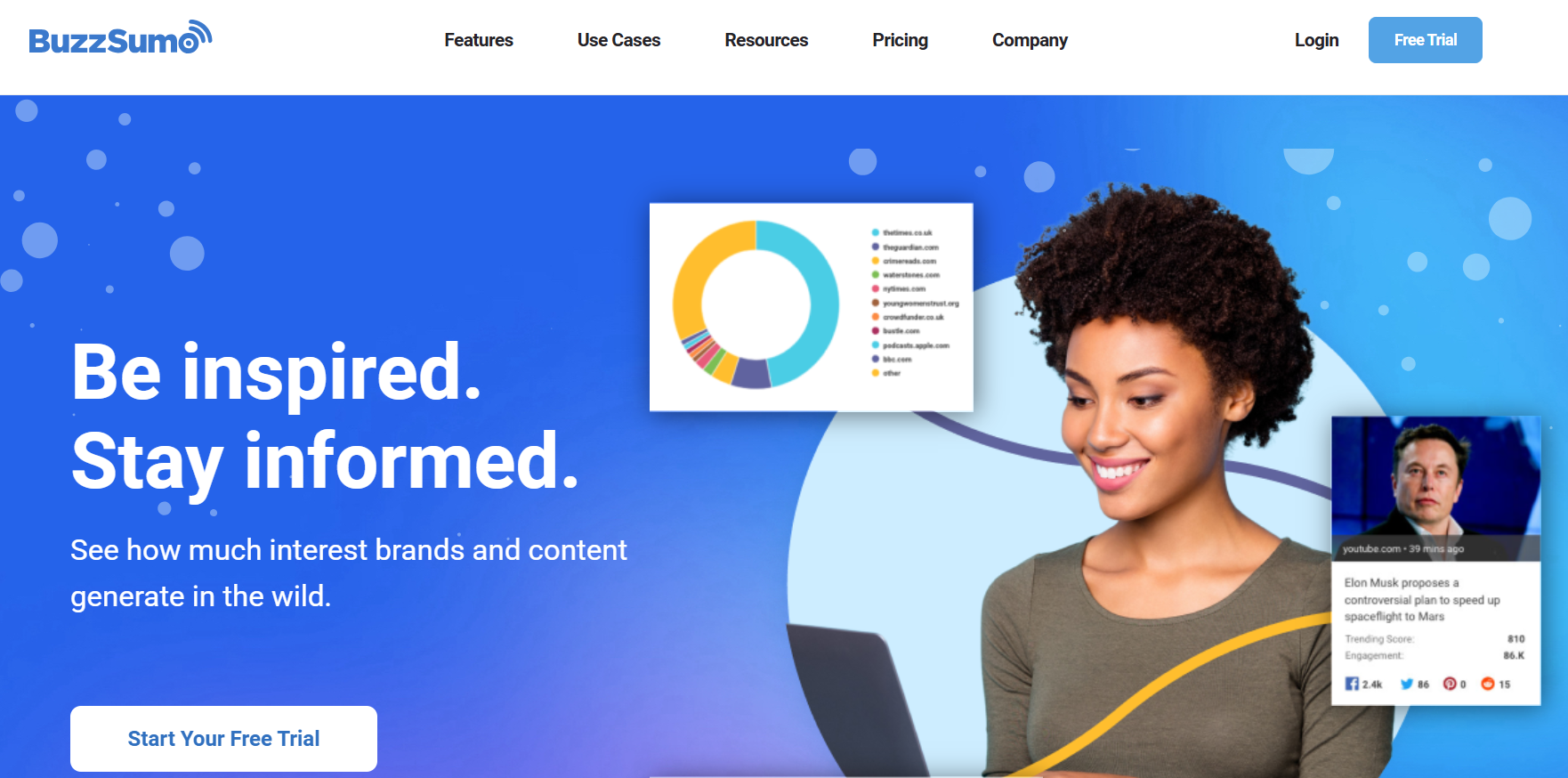
Best For: Finding top-performing competitor content and spotting content gaps in your SEO strategy.
Key Features of BuzzSumo
Content Analysis Tool - Shows which articles get the most engagement so you can see what drives organic search traffic.
Competitor Content Tracking - Helps you monitor SERP competitors by showing what topics rank well and gain backlinks.
Influencer Finder - Identifies authors and creators who often appear in search engine results pages for your niche.
Trending Topics - Highlights topics gaining attention, helping you create content before ranking positions shift.
Backlink Checker Tools - Shows which pages attract links so you can study link-building patterns and domain authority growth.
Keyword Insights - Provides keyword metrics related to high-performing content, including ranking difficulty and Intent Signal.
Pros of BuzzSumo
- Great for content marketing teams who want to understand organic search patterns.
- Helps spot content gaps based on engagement, shares, and backlinks.
Cons of BuzzSumo
- Limited rank tracking features.
Pricing of BuzzSumo
BuzzSumo offers a 7-day free trial with the following pricing plans:
- Content Creation: $199/mo for 1 user
- PR & Comms: $299/mo for 5 users
- Suite: $499/mo for 10 users
- Enterprise: $999/mo for 30 users
10. Ubersuggest — Best Free SEO Tool for Beginners
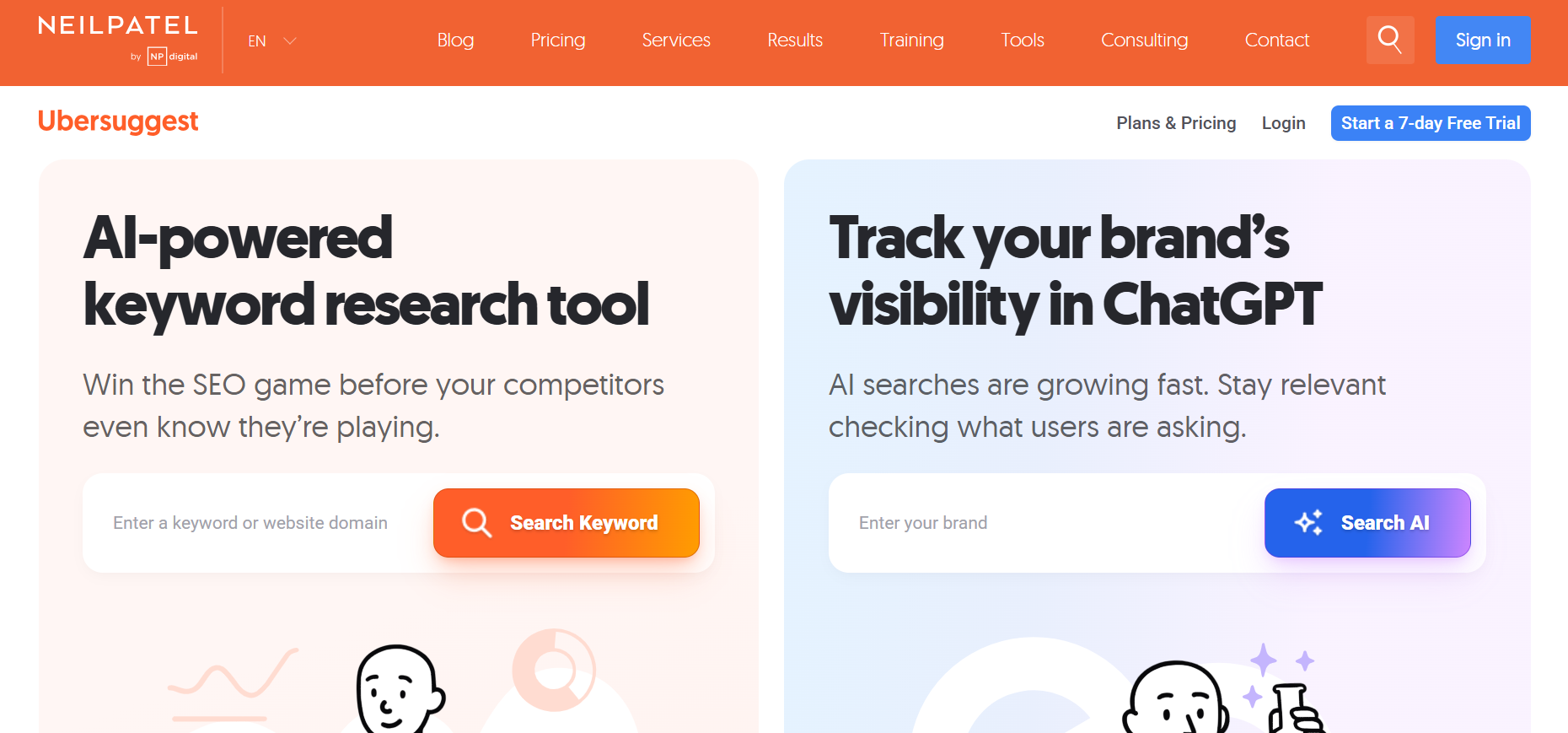
Best For: Basic keyword research, rank tracking, and simple competitor analysis in an affordable budget.
Key Features of Ubersuggest
Keyword Research Tool - Shows keyword metrics like search volume, ranking difficulty, and long-tail keywords to help shape your SEO strategy.
Domain Overview - Gives a quick look at organic search traffic, ranking positions, and domain authority for competitor sites.
Rank Tracking Tools - Tracks keyword rankings over time and shows ranking fluctuations across search engines.
Content Ideas Tool - Suggests topics and content gaps by showing what already performs well on competitor pages.
Backlink Checker Tools - Shows backlink sources and linking domains but with a smaller index than Ahrefs or SEMrush.
Technical SEO Audit - Checks basic technical SEO issues like missing tags, broken pages, and site speed concerns.
Pros of Ubersuggest
- Affordable option with a free plan for small websites and SMEs.
- Good for quick content analysis and keyword research.
Cons of Ubersuggest
- Update frequency is slower compared to premium SEO analytics tools.
- Limited in-depth competitor price monitoring or competitive intelligence tools.
Pricing of Ubersuggest
Offers a free plan, with paid plans:
- Business: $20/mo for 2-7 websites
- Individual: $12/mo for 1 website
- Enterprise: $40/mo for 8-15 websites
Comparison Table - A Quick View of Top Tools to Monitor SERP Competitors
| Tool | Best For | Key Features | Missing Features | Pricing |
|---|---|---|---|---|
| ScrapX | Website monitoring SEO and safe page-change tracking | Track a page for text/visual updates, SSL alerts, subdomain checks, data extraction | No keyword rankings or backlink checker tools | Starting $11/mo |
| Ahrefs | Backlinks, keyword research, rank tracking | Site Explorer, long-tail keywords, ranking data, content gaps | No visual monitoring or price change tracking | From $129/mo |
| SEMrush | All-in-one SEO analytics tools | Rank tracking, PPC keywords, SERP Checker, site audit | Higher cost for large search limit | From $199/mo |
| SpyFu | PPC keywords and historical ranking positions | Paid keyword tracking, ranking fluctuations, ad history | Weak backlink database | From $39/mo |
| SE Ranking | Daily rank tracking and local search data | Keyword rankings, domain audit, SERP competitors ranking | Smaller backlink index | From $65/mo |
| Moz Pro | Keyword metrics and domain authority | Keyword Explorer, link analysis, technical SEO issues | Slower link index | From $39/mo |
| Screaming Frog | Technical SEO and content analysis | Site audit, metadata extraction, broken links | No rank tracking or keyword tools | $279/mo |
| Visualping | Visual change alerts on competitor sites | Layout tracking, banner updates, design checks | No keyword research or SEO strategy tools | $70/mo |
| BuzzSumo | Content marketing and engagement data | Content analysis, backlinks, trending topics | No rank tracking tools | From $119/mo |
| Ubersuggest | Basic keyword research & site audit | Keyword metrics, backlink data, domain overview | Slower updates | From $12/mo |
How to Choose the Right SEO Competitor Tool
Choosing the right tool to monitor SERP competitors depends on what you want to track.
Some teams focus on keyword rankings, ranking positions, and rank tracking tools. Others care more about backlinks, PPC keywords, or technical SEO issues. And if you want to monitor SERP competitors for content updates, design changes, or price edits, you need a complete and affordable website monitoring SEO tool like ScrapX.
Start by listing your main goals:
- Do you want to track competitor keywords?
- Do you need a backlink checker to compare domain authority?
- Do you want a SERP Checker to find featured snippets, SERP features, and local map packs?
- Do you need to track a page for content changes or design updates?
Most teams use more than one tool. A common setup is ScrapX for page updates + Ahrefs or SEMrush for keyword research and ranking data. This gives you full visibility across organic search traffic, content gaps, ranking difficulty, and shifts in search engine results pages.
Balance cost, automation, and accuracy.
Some tools cost more because they offer deeper competitive intelligence tools, daily rank tracking, or wider search limit access. Others, like ScrapX, keep things simple by focusing on reliable page change tracking.
Choose the tools that help you monitor SERP competitors without guesswork and keep your SEO strategy focused on clear data.
Key Takeaways
The best SEO competitor tools help you understand keyword rankings, ranking positions, backlinks, content gaps, and changes on competitor sites. Use ScrapX to track a page for updates, and pair it with rank tracking tools like Ahrefs or SEMrush to monitor SERP competitors across search engines. With the right mix, you get more precise data, better competitor analysis, and a stronger SEO strategy built on facts, not guesses.
Frequently Asked Questions
Q1: What's the best SEO competitor tool overall?
For keyword rankings and backlink data, SEMrush and Ahrefs work well. For website monitoring, SEO, and safe page-change tracking, ScrapX helps you monitor SERP competitors without risk.
Q2: Are there free tools for competitor SEO tracking?
Yes. Google Alerts, Ubersuggest, and the ScrapX Free Plan offer basic competitor analysis for keywords, content updates, and public-page checks, ideal for limited search needs.
Q3: What tool tracks visual changes on competitor pages?
ScrapX and Visualping detect layout updates, banner swaps, and small design shifts that may affect ranking positions, SERP features, and overall organic search visibility.
Q4: How do I ethically monitor competitors?
Track only public pages, avoid private data, respect robots.txt, and stay within safe limits. ScrapX follows these rules by default when you monitor SERP competitors.
Q5: Which tool helps track content updates that affect keyword rankings?
If you want to monitor SERP competitors for content edits, title changes, or pricing updates, ScrapX lets you track a page and see updates that influence keyword rankings.